-
ORIGINAL ARTICLE10-09-2023
Women’s Childbirth Experiences During COVID-19 Pandemic in Indonesia
Revista Brasileira de Enfermagem. 2023;76:e20220640
Abstract
ORIGINAL ARTICLEWomen’s Childbirth Experiences During COVID-19 Pandemic in Indonesia
Revista Brasileira de Enfermagem. 2023;76:e20220640
DOI 10.1590/0034-7167-2022-0640
Views0See moreABSTRACT
Objective:
Explore in depth the experiences of women giving birth during the COVID-19 pandemic in Indonesia.
Methods:
Qualitative research with a descriptive phenomenological. A total of 16 participants did not suffer from COVID-19 and gave birth during the COVID-19 pandemic in the community setting area.
Results:
There are five themes: 1: Feelings of anxiety and fear of giving birth in hospitals are experienced by women giving birth during the COVID-19 pandemic, 2. Screening for COVID and health protocols applied in hospitals during the COVID-19 pandemic, 3. Support from husbands, families, and health workers is needed when giving birth during the COVID-19 pandemic, 4. Lack of family visits hours is an obstacle during childbirth, particularly during the COVID-19 pandemic, and 5: Bonding attachment between mother and baby while at the hospital.
Conclusion:
Optimal maternity nursing care and supporting health facilities and public policies will help mothers give birth during the COVID-19 pandemic in Indonesia.
-
10-09-2023
Patient safety with covid-19 in hospital units: a scoping review
Revista Brasileira de Enfermagem. 2023;76:e20220557
Abstract
Patient safety with covid-19 in hospital units: a scoping review
Revista Brasileira de Enfermagem. 2023;76:e20220557
DOI 10.1590/0034-7167-2022-0557
Views0See moreABSTRACT
Objective:
Map, in the scientific literature, the actions taken to promote the safety of patients with covid-19 in the hospital context.
Methods:
This is a scoping review according to the Joanna Briggs Institute, using the Checklist Preferred Reporting Items for Systematic Reviews and Meta-Analyses Extension for Scoping Reviews. In April 2022, searches were performed on nine data sources. The results were summarized in a table and analyzed descriptively.
Results:
Fifteen studies were selected to compose the final sample. Most articles refer to cohort studies, followed by clinical trials. As for the areas of activity, there was a predominance of surgical centers, followed by adult and pediatric Intensive Care Units.
Conclusions:
With this review, it was possible to map measures such as contingency plans and reorganization of beds, rooms, and operating rooms, in addition to the isolation and distancing practiced by patients and professionals.
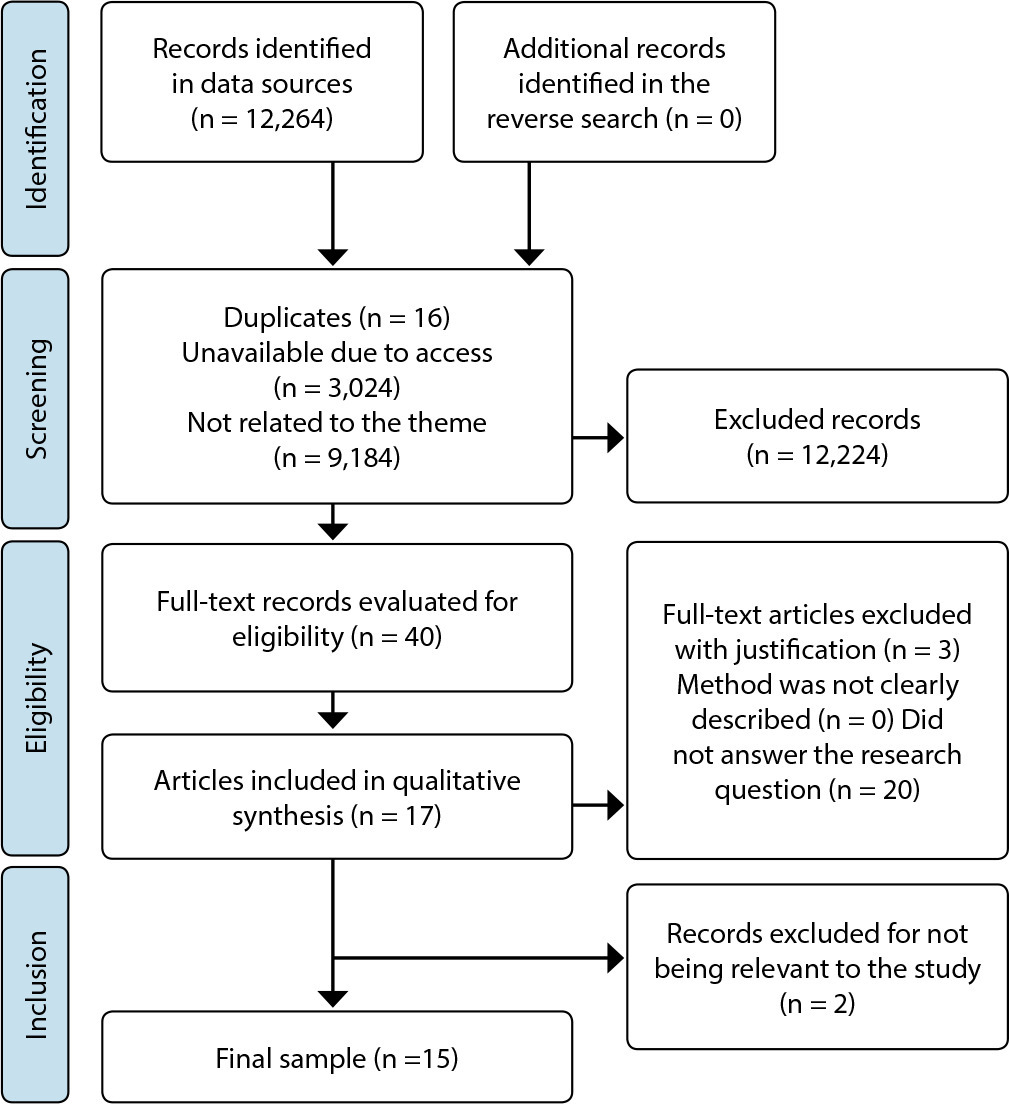
-
10-09-2023
A pós-pandemia de COVID-19: perspectivas da atuação profissional na enfermagem
Revista Brasileira de Enfermagem. 2023;76:e76Suppl101
Abstract
A pós-pandemia de COVID-19: perspectivas da atuação profissional na enfermagem
Revista Brasileira de Enfermagem. 2023;76:e76Suppl101
DOI 10.1590/0034-7167.202376Suppl101pt
Views0Durante a pandemia de COVID-19, os trabalhadores de enfermagem foram essenciais na prestação de cuidados à saúde, diante do elevado número de pessoas infectadas pelos vírus SARS-CoV-2 e adoecidos pela COVID-19 e pela Síndrome Respiratória Aguda Grave (SRAG). Neste contexto, os serviços de saúde ficaram sobrecarregados, e muitos de seus profissionais adoeceram e morreram.A enfermagem […]See more -
ORIGINAL ARTICLE10-09-2023
Transition of care in post-hospitalization patients due to covid-19 in a hospital in northeastern Brazil
Revista Brasileira de Enfermagem. 2023;76:e20230030
Abstract
ORIGINAL ARTICLETransition of care in post-hospitalization patients due to covid-19 in a hospital in northeastern Brazil
Revista Brasileira de Enfermagem. 2023;76:e20230030
DOI 10.1590/0034-7167-2023-0030
Views0See moreABSTRACT
Objective:
To analyze the transition of care for post-hospitalization patients due to covid-19 in a hospital in northeastern Brazil.
Methods:
Quantitative, cross-sectional, descriptive, and analytical study carried out between 2020 and 2021. The sample had 78 patients. Data collection took place by telephone with the support of a sociodemographic questionnaire and the care transition assessment instrument (Care Transitions Measure).
Results:
The average length of stay was 24.04 days. The average score for care transition was 71.68 (±11.71). “Self-management training” and “Understanding of medications” had higher averages, 75.15 (±13.76) and 74.10 (±16.20).
Conclusions:
The average length of stay was 24.04 days. The average score for care transition was 71.68 (±11.71). “Self-management training” and “Understanding of medications” had higher averages, 75.15 (±13.76) and 74.10 (±16.20).
-
10-09-2023
Experiências de parto de mulheres durante a pandemia de COVID-19 na Indonésia
Revista Brasileira de Enfermagem. 2023;76:e20220640
Abstract
Experiências de parto de mulheres durante a pandemia de COVID-19 na Indonésia
Revista Brasileira de Enfermagem. 2023;76:e20220640
DOI 10.1590/0034-7167-2022-0640
Views0See moreRESUMEN
Objetivo:
Explorar en profundidad las experiencias de las mujeres que dieron a luz durante la pandemia de COVID-19 en Indonesia.
Métodos:
Investigación cualitativa con enfoque fenomenológico descriptivo. Un total de 16 participantes que no sufrieron de COVID-19 dieron a luz durante la pandemia de COVID-19 en el entorno comunitario.
Resultados:
Hay cinco temas: 1: Los sentimientos de ansiedad y miedo de dar a luz en los hospitales son experimentados por las mujeres que dan a luz durante la pandemia de COVID-19, 2. Detección de COVID y protocolos de salud aplicados en los hospitales durante la pandemia de COVID-19, 3. Se necesita el apoyo de esposos, familias y trabajadores de la salud cuando se da a luz durante la pandemia de COVID-19, 4. La falta de horarios de visitas familiares es un obstáculo durante el parto, particularmente durante la pandemia de COVID-19, y 5: Vínculo entre madre y bebé mientras están en el hospital.
Conclusión:
la atención de enfermería de maternidad óptima y el apoyo de los centros de salud y las políticas públicas ayudarán a las madres a dar a luz durante la pandemia de COVID-19 en Indonesia.
-
10-09-2023
Comportamentos saudáveis e risco de doenças cardiovasculares entre docentes de enfermagem durante a pandemia de COVID-19
Revista Brasileira de Enfermagem. 2023;76:e20220372
Abstract
Comportamentos saudáveis e risco de doenças cardiovasculares entre docentes de enfermagem durante a pandemia de COVID-19
Revista Brasileira de Enfermagem. 2023;76:e20220372
DOI 10.1590/0034-7167-2022-0372
Views0See moreRESUMEN
Objetivo:
Las enfermedades cardiovasculares son la primera causa de muerte en todo el mundo. La adopción de hábitos de vida que promuevan la salud mantendrá la salud cardiovascular del individuo y reducirá el riesgo de enfermedades cardiovasculares.
Métodos:
En este estudio descriptivo, se encuestó a 150 profesores de enfermería mediante un método de muestreo no probabilístico (intencional) para evaluar su adhesión a un estilo de vida promotor de la salud con el fin de conocer el riesgo de enfermedades cardiovasculares. Para ello, se utilizó la versión árabe del Health-Promoting Lifestyle Profile II (HPLP-II).
Resultados:
Setenta y dos profesores de enfermería completaron la encuesta. Los resultados indicaron que la muestra del estudio tenía un nivel moderado de promoción de la salud basado en el Health-Promoting Lifestyle Profile II.
Conclusión:
Los profesores de enfermería corren el riesgo de desarrollar enfermedades cardiovasculares en función de sus comportamientos de promoción de la salud, ya que obtuvieron una puntuación baja en responsabilidad de salud, actividad física y gestión del estrés. Se recomienda impulsar comportamientos saludables para prevenir enfermedades crónicas como las cardiovasculares.
-
10-09-2023
The post-COVID-19 pandemic: perspectives of professional practice in nursing
Revista Brasileira de Enfermagem. 2023;76:e76Suppl101
Abstract
The post-COVID-19 pandemic: perspectives of professional practice in nursing
Revista Brasileira de Enfermagem. 2023;76:e76Suppl101
DOI 10.1590/0034-7167.202376Suppl101
Views0During the COVID-19 pandemic, nursing workers were essential in providing health care, given the high number of people infected with SARS-CoV-2 viruses and sick with COVID-19 and Severe Acute Respiratory Syndrome (SARS). In this context, health services were overloaded, and many of their professionals fell ill and died.Nursing proved to be essential during the critical […]See more -
10-06-2023
Evidências do cuidado centrado no paciente no contexto da prática profissional de saúde brasileira
Revista Brasileira de Enfermagem. 2023;76(5):e20220448
Abstract
Evidências do cuidado centrado no paciente no contexto da prática profissional de saúde brasileira
Revista Brasileira de Enfermagem. 2023;76(5):e20220448
DOI 10.1590/0034-7167-2022-0448
Views0See moreRESUMEN
Objetivos:
analizar las actitudes centradas en el paciente en el cuidado y compartir prácticas de profesionales de enfermería, logopedia, odontología y medicina.
Métodos:
se utilizó una investigación transversal con 411 profesionales, y como medida de resultado se aplicó el instrumento Patient-Practitioner Orientation Scale.
Resultados:
los médicos presentaron puntuaciones medias más altas, lo que refleja una orientación centrada en el paciente, control compartido y enfoque en la persona, con diferencia estadística para todos los dominios (p<0,02). Los odontólogos fueron los profesionales que presentaron puntajes más bajos, especialmente en el dominio compartir, con diferencia estadística en relación a los enfermeros, logopedas y médicos (p<0,05).
Conclusiones:
finalmente, las actitudes de los profesionales de las áreas de salud estudiadas indicaron preferencia autorreferida por la centralidad en los pacientes. En este contexto, el cuidado centrado en el paciente puede ser un recurso importante en el cuidado de la salud cuando se apuesta por la superación del objeto hombre.
-
ERRATUM04-22-2020
ERRATUM
Revista Brasileira de Enfermagem. 2020;73(3):202073n3e05
Abstract
ERRATUMERRATUM
Revista Brasileira de Enfermagem. 2020;73(3):202073n3e05
DOI 10.1590/0034-7167.202073n3e05
Views0Article “Concept formation of ambience for labor and normal institutionalized delivery”, with number of DOI: , published in the journal Revista Brasileira de Enfermagem, 72(Suppl 3):348-59, on page 357:Include after Final Considerations the information:[…]See more -
ORIGINAL ARTICLE04-09-2020
Health promotion in schools: speeches, representations, and approaches
Revista Brasileira de Enfermagem. 2020;73(3):e20180774
Abstract
ORIGINAL ARTICLEHealth promotion in schools: speeches, representations, and approaches
Revista Brasileira de Enfermagem. 2020;73(3):e20180774
DOI 10.1590/0034-7167-2018-0774
Views0See moreABSTRACT
Objectives:
to analyze speeches, representations, and approaches on health and health promotion in schools, materialized in the speech of teachers.
Methods:
a qualitative study, of the case study type, carried out with 17 teachers from the municipal and state educational network. The data were obtained from interviews and analyzed by the Content-Oriented Discourse Analysis.
Results:
medical-sanitary and clinical-biological discourses predominated. Health is represented as the absence of disease, reflecting approaches that prioritize healthy habits and changes in behavior. Problematization of social determinants occurs in projects, in an intersectorial partnership.
Final Considerations:
carrying out projects of health promotion in schools ignores the solidification of partnerships and the construction of new speeches that represent it as quality of life conditioned by social, economic, and cultural factors as well as strategies for the ideological repositioning of those actors who act in this setting.
-
ORIGINAL ARTICLE04-09-2020
Nursing work and competence in hemotherapy services: an ergological approach
Revista Brasileira de Enfermagem. 2020;73(3):e20180775
Abstract
ORIGINAL ARTICLENursing work and competence in hemotherapy services: an ergological approach
Revista Brasileira de Enfermagem. 2020;73(3):e20180775
DOI 10.1590/0034-7167-2018-0775
Views0See moreABSTRACT
Objetives:
to analyze the ingredients of the competence that the nurses use in the performance of their work in hemotherapy.
Methods:
qualitative study with 22 nurses, accomplished through documentary study, observation and semi-structured interview, with resources of Atlas.ti software based on the foundations of Historical Materialism Dialectic and Ergology. Performed Content Analysis.
Results:
the domain of specific knowledge of hemotherapy and the time of experience in the area, allied to the motivation of the worker and the ability to work in a team favor the competent action in the work activities. On the other hand, the lack of adequate work conditions, especially in relation to adequate materials, equipment and structure, impairs the work of the nurse in hemotherapy.
Final Considerations:
experience gained is critical to successful decision making. In addition, adequate working conditions, updating of knowledge and ability in teamwork favor a scenario of safe practices.
-
ORIGINAL ARTICLE04-22-2020
Happiness as a strength in the promotion of adolescent and adult young health
Revista Brasileira de Enfermagem. 2020;73(3):e20190064
Abstract
ORIGINAL ARTICLEHappiness as a strength in the promotion of adolescent and adult young health
Revista Brasileira de Enfermagem. 2020;73(3):e20190064
DOI 10.1590/0034-7167-2019-0064
Views0See moreABSTRACT
Objectives:
to assess the relation between sociodemographic characteristics of young people associated with the subjectivity of being happy; to evaluate the relationship between the subjectivity of being happy and the perception of health status; to evaluate the relationship between the subjectivity of being happy and the school and family environments and peer groups at school.
Methods:
this is an observational study, with an intentional sample of 1,069 young Portuguese people, with ages varying from 14 to 24, most of them women, attending secondary education. The self-filling questionnaire was used.
Results:
there are statistically significant associations between the subjectivity of being happy and schooling, perception of health status, family APGAR, school and family involvement, absence of problems or teasing by peers at school.
Conclusions:
a positive and holistic care coupled with the potential of obtaining and consolidating healthy lifestyles for young people will enable health professionals to perceive them as agents of individual and social change.
-
ORIGINAL ARTICLE04-22-2020
Preventing vertical HIV virus transmission: hospital care assessment
Revista Brasileira de Enfermagem. 2020;73(3):e20190491
Abstract
ORIGINAL ARTICLEPreventing vertical HIV virus transmission: hospital care assessment
Revista Brasileira de Enfermagem. 2020;73(3):e20190491
DOI 10.1590/0034-7167-2019-0491
Views0See moreABSTRACT
Objectives:
assess the implementation of actions to prevent vertical transmission of HIV.
Methods:
a retrospective cohort study conducted in two maternity hospitals in the city of Montes Claros, State of Minas Gerais. All women admitted for childbirth diagnosed with HIV and their respective newborns were included from 2014 to 2017. Data were collected from medical records and analyzed descriptively.
Results:
population consisted of 46 pairs of mothers and newborns. Management was considered inadequate in 30 cases of parturient/postpartum women (65.2%) and 14 cases of newborns (30.4%). The main reasons for inadequate maternal management were lack of pharmacological inhibition of lactation (53.3%) and counseling/consent for HIV testing (43.3%). For newborns, late onsetoffirst dose ofZidovudine (50.0%) and no prescriptionofNevirapine (28.6%).
Conclusions:
important prevention opportunities were missed, pointing to the need for improved care.
-
ORIGINAL ARTICLE06-08-2020
Maternal-child nursing care for adolescent mothers: health education
Revista Brasileira de Enfermagem. 2020;73(4):e20180769
Abstract
ORIGINAL ARTICLEMaternal-child nursing care for adolescent mothers: health education
Revista Brasileira de Enfermagem. 2020;73(4):e20180769
DOI 10.1590/0034-7167-2018-0769
Views0See moreABSTRACT
Objectives:
to develop an educational intervention through a game that addresses aspects related to adolescent motherhood and child care.
Methods:
this is an action research based on diagnosis, intervention and apprehension stages.
Results:
the situational diagnosis was based on a literature review on adolescent motherhood and child care. In the intervention stage, the educational game’s first version was elaborated. In the third stage constituted by apprehension, the game was submitted to assessment of interdisciplinary experts. Suggestions of experts were adopted and the game had its second version.
Final Considerations:
the educational intervention in the present study appears a care technology that adds knowledge and practices to the work of nurses in Primary Health Care, focusing on adolescent women and children health care.
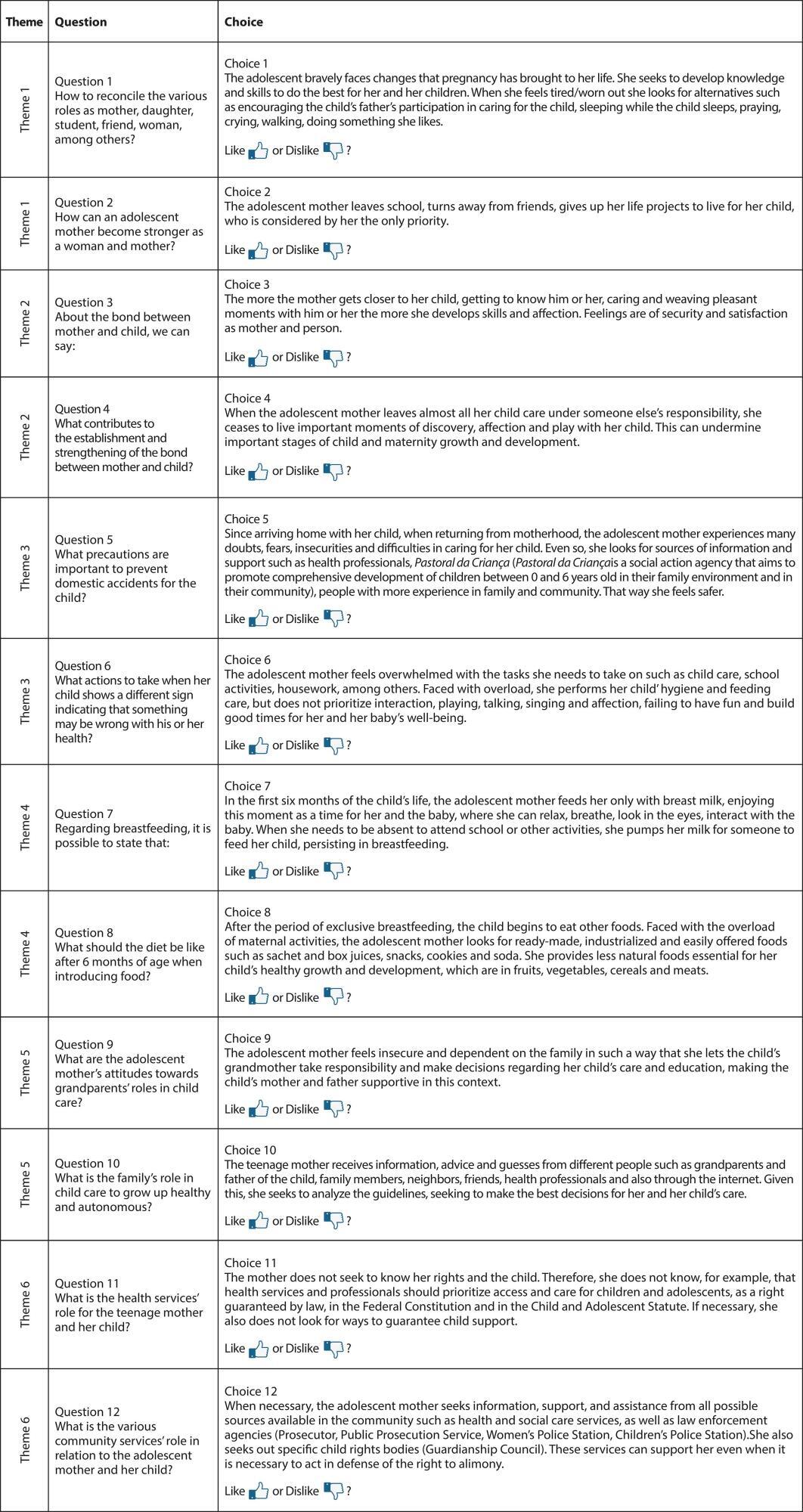
-
REVIEW06-01-2020
Access of the black population to health services: integrative review
Revista Brasileira de Enfermagem. 2020;73(4):e20180834
Abstract
REVIEWAccess of the black population to health services: integrative review
Revista Brasileira de Enfermagem. 2020;73(4):e20180834
DOI 10.1590/0034-7167-2018-0834
Views1See moreABSTRACT
Objectives:
demonstrate and discuss how the black population’s access to health services occurs
Methods:
integrative literature review with the following question: How does the black population’s access to health services occur? The search was carried out in the Scholar, LILACS and SciELO databases and used the descriptor “access to health services” and the term “population,” resulting in a sample with twelve articles.
Results:
studies show that the difficulty of access is a fundamental factor for the quality of life of people, directly compromising preventive services, especially for women’s health and, in addition, it has significant impact on the illness process of the black population within its particularities.
Final Considerations:
several limiting factors compromise the black population’s access to health services, including institutional and structural factors

-
ORIGINAL ARTICLE05-18-2020
Militancy of nurses in the institutionality field: printed media versions
Revista Brasileira de Enfermagem. 2020;73(4):e20180835
Abstract
ORIGINAL ARTICLEMilitancy of nurses in the institutionality field: printed media versions
Revista Brasileira de Enfermagem. 2020;73(4):e20180835
DOI 10.1590/0034-7167-2018-0835
Views0See moreABSTRACT
Objectives:
to analyze nurses’ professional militancy in the institutionality field, presented by the printed media from Bahia State in the 1970s and 1980s.
Methods:
a historical and qualitative research under Social History’s perspective, whose data source was the newspaper A Tarde. The temporal cut-off encompasses milestones such as professional body restructuring and creation.
Results:
the Associação Brasileira de Enfermagem democratization movement was reported in a superficial way, highlighting the struggle for power spaces. With respect to Conselhos Federal e Regional de Enfermagem daBahia, the newspaper notified creation and function of bodies, however, there was no visibility to the newspaper’s performance. Concerning the union, there was political fragility of nurses against the creation and union participation in the fight for labor rights.
Final Considerations:
organization of political action occurred from isolated groups mobilization of professionals who were already traveling in political spaces, not the large mass of professionals.
-
08-19-2019
Humor intervention in the nurse-patient interaction
Revista Brasileira de Enfermagem. 2019;72(4):1078-1085
Abstract
Humor intervention in the nurse-patient interaction
Revista Brasileira de Enfermagem. 2019;72(4):1078-1085
DOI 10.1590/0034-7167-2018-0609
Views0ABSTRACT
Objective:
To describe the factors influencing the use of humor in nursing care, its applicability and benefits.
Method:
A scoping review was performed using the Arksey and O’Mally methodology. A search for articles published between 2008 and 2018 was performed using the platforms EBSCO Host, Virtual Health Library and Google Scholar.
Results:
From the initial 465 articles found, 17 were included for final revision. Data allowed to retrieve information on humor definition; its applicability as a nursing intervention; humor as a tool to improve nurse-patient communication and relationship; influence factors; type of humor interventions; humor benefits in health care context and; limitations and precautions of humor intervention.
Conclusion:
The use of humor promotes both communication and human interaction; it promotes well-being; helps deal/cope with difficult and unpleasant situations, reduces tension, discomfort and stress; and strengthens the immune system. This intervention should be used with caution.
Keywords:CommunicationNurse-Patient RelationsNursingPatient Outcome AssessmentWit and Humor as SubjectSee more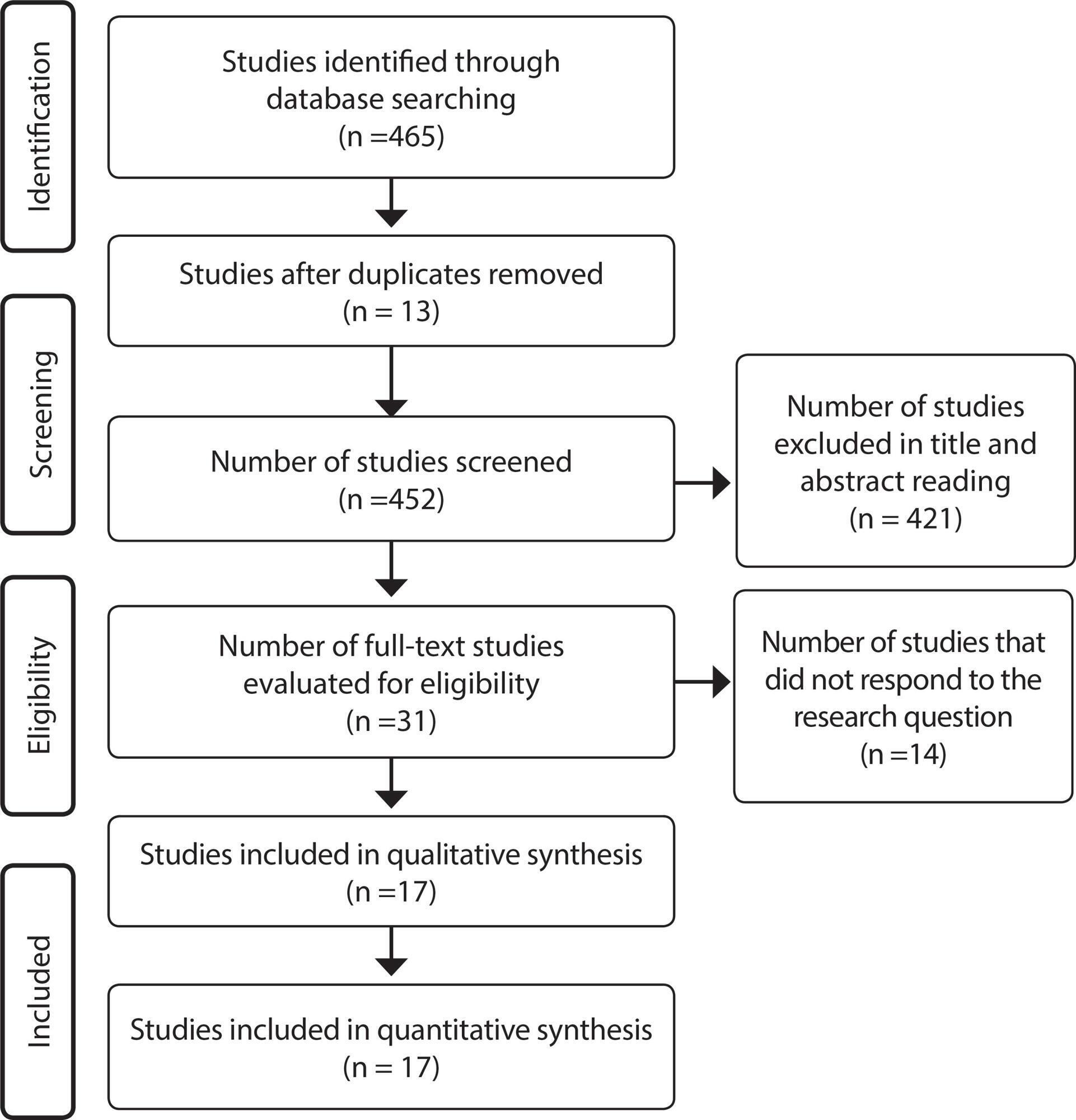
-
ORIGINAL ARTICLE10-21-2019
Workloads and burnout of nursing workers
Revista Brasileira de Enfermagem. 2019;72(6):1435-1441
Abstract
ORIGINAL ARTICLEWorkloads and burnout of nursing workers
Revista Brasileira de Enfermagem. 2019;72(6):1435-1441
DOI 10.1590/0034-7167-2017-0659
Views0See moreABSTRACT
Objective:
to identify workloads in nursing work and its association with nursing worker burnout.
Method:
a cross-sectional study, including 211 nursing workers from a university hospital, between July and August 2016. For the analysis, the descriptive statistics, Chi-Square Test, Fisher’s Exact Test and Mann Whitney U-Test were used.
Results:
the most evidenced loads were biological. A significant association was found between workloads and workers’ occupation, as well as a significant association between workloads and worker burnout. Burnout caused upper limb pain, neck and lumbar pain, lower limb pain, muscle spasm, lower limb edema, mental fatigue, headache, nervousness, and forgetfulness.
Conclusion:
workloads identification is a subsidy for the promotion of interventions that minimize the burnout generated to the health of the nursing worker.
-
REVIEW12-05-2019
Vulnerability of the elderly: a conceptual analysis
Revista Brasileira de Enfermagem. 2019;72:337-344
Abstract
REVIEWVulnerability of the elderly: a conceptual analysis
Revista Brasileira de Enfermagem. 2019;72:337-344
DOI 10.1590/0034-7167-2018-0728
Views0See moreABSTRACT
Objective:
To analyze the concept of vulnerability of the elderly.
Method:
A concept analysis, according to the method proposed by Walker and Avant, operationalized through integrative review through search in scientific data portals using the
Descriptors:
Health vulnerability, aged, health services for the aged, health of the elderly, vulnerable populations and geriatric health services. To compose the literary corpus, 36 studies were selected.
Results:
Concept antecedents, as well as its attributes, were identified in individual, social and programmatic characteristics, which make up the characteristics of “vulnerability of the elderly”, besides consequences of the phenomenon. These characteristics were analyzed with emphasis on aspects that contribute to the process of vulnerability of the elderly.
Conclusion:
The study demonstrated the multidimensionality of the phenomena studied, highlighting the peculiarities of vulnerability during aging. However, there is a need for further studies on the construct.
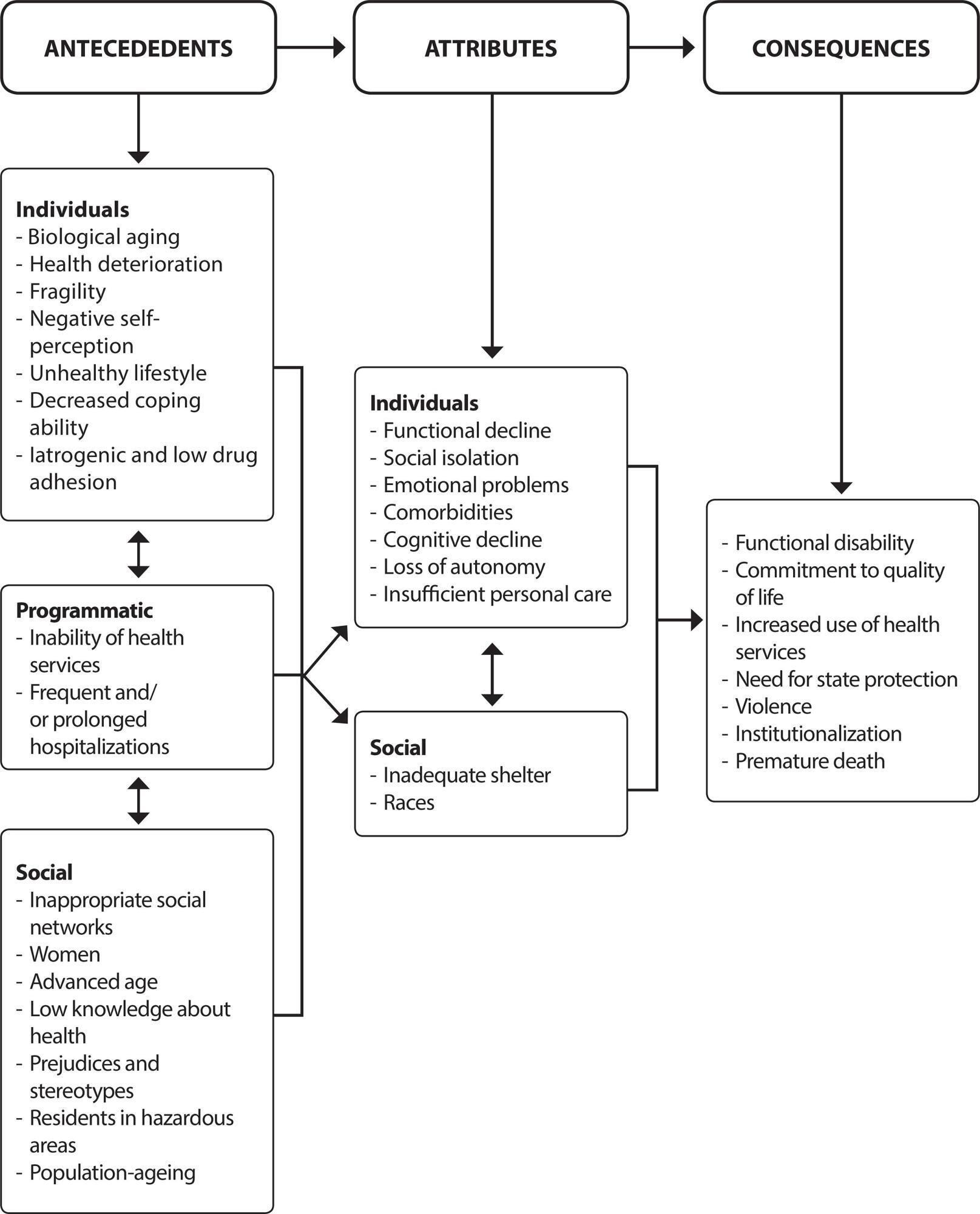
-
ORIGINAL ARTICLE07-13-2020
Incontinence-associated dermatitis in elderly patients: prevalence and risk factors
Revista Brasileira de Enfermagem. 2020;73:e20180475
Abstract
ORIGINAL ARTICLEIncontinence-associated dermatitis in elderly patients: prevalence and risk factors
Revista Brasileira de Enfermagem. 2020;73:e20180475
DOI 10.1590/0034-7167-2018-0475
Views0See moreABSTRACT
Objective:
To determine the prevalence and risk factors for incontinence-associated dermatitis in the elderly.
Method:
Cross-sectional exploratory study carried out in public hospitals. The dermatitis prevalence and associations were obtained by calculating the ratio. The effect dimension was estimated by the odds ratio with a 95% confidence interval and statistical significance p <0.05.
Results:
138 elderly people were included, with an average age of 77.2 years old (± 9.3); 69 (50%) had combined fecal and urinary incontinence. The dermatitis prevalence was 36.2% (50); 28% (14) had pressure injuries; 14% (7), candidiasis. Risk factors were: longer hospital stay (Odds Ratio = 5.8 [2.6-12.9]), obesity (Odds Ratio = 3.6 [1.2-10.4]), high level of dependence (Odds Ratio = 2.4 [1,1-5,0]) and high risk for pressure injury (Odds Ratio = 6.1 [1,4-26,9]).
Conclusion:
The study found a high prevalence of dermatitis associated with incontinence. The early recognition of risk factors favors effective preventive actions.
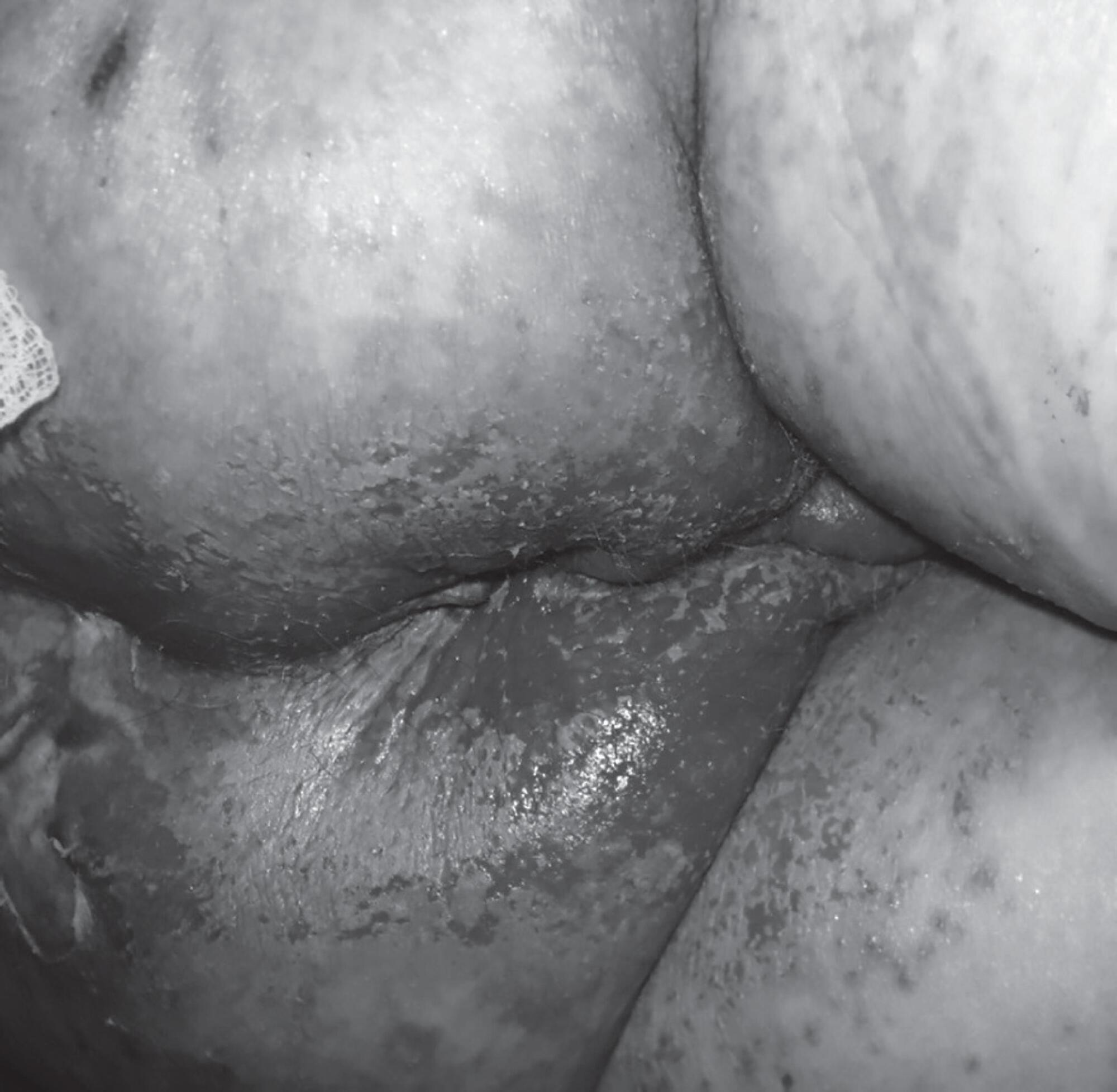
-
08-19-2019
Clinical simulation in nursing education in intensive therapy: an integrative review
Revista Brasileira de Enfermagem. 2019;72(4):1061-1070
Abstract
Clinical simulation in nursing education in intensive therapy: an integrative review
Revista Brasileira de Enfermagem. 2019;72(4):1061-1070
DOI 10.1590/0034-7167-2018-0217
Views0See moreABSTRACT
Objective:
to analyze the publications on clinical simulation practices for education in Nursing in Intensive Care.
Method:
an integrative review carried out through LILACS, PubMed, Cochrane Library, CINAHL and SciELO databases, of articles published from 2008 to 2017.
Results:
29 articles were selected, of which 76% discuss the use of simulation in continuing education of nursing professionals, while the others describe their use for student education. There is a higher prevalence of studies with a level of evidence 6 (17), with 28 international publications. There was an increase in scientific production, with 16 articles published in the last three years.
Conclusion:
variables after simulation use, such as confidence, communication skills, efficiency in the identification of clinical worsening of patients, development of technical skills, teamwork and clinical decision-making, presented a significant improvement, demonstrating that this tool is effective in qualifying care for critical patients.
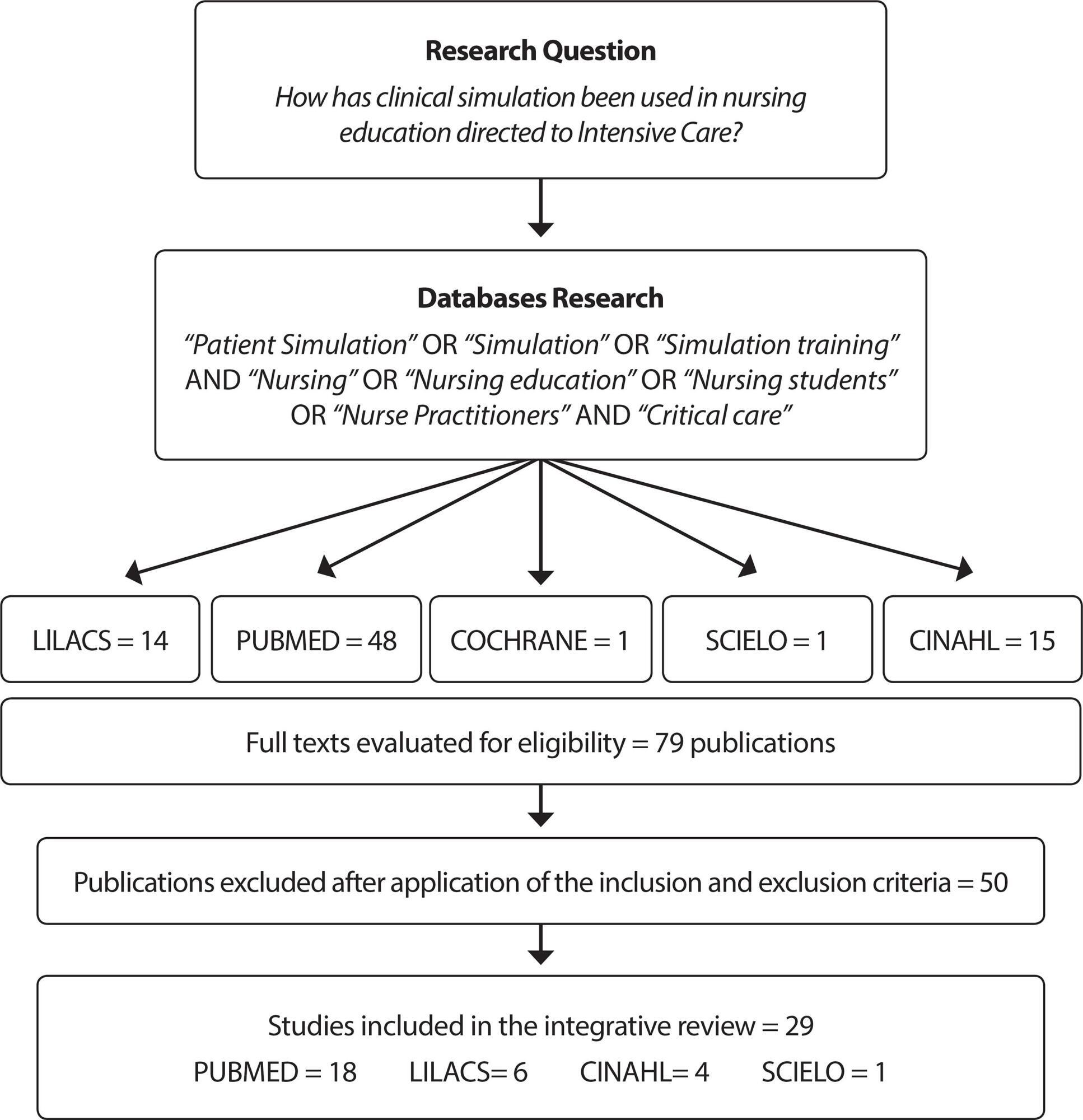
-
01-20-2021
Burnout Syndrome and Associated Factors in Intensive Care Unit Nurses
Revista Brasileira de Enfermagem. 2021;74:e20190535
Abstract
Burnout Syndrome and Associated Factors in Intensive Care Unit Nurses
Revista Brasileira de Enfermagem. 2021;74:e20190535
DOI 10.1590/0034-7167-2019-0535
Views0See moreABSTRACT
Objective:
to estimate prevalence and factors associated with Burnout Syndrome in intensive care nurses in a city in the state of Bahia.
Methods:
a cross-sectional, population-based study carried out with 65 intensive care nurses through a self-administered questionnaire, from July to November 2016, containing sociodemographic data, lifestyle, work characteristics. To define burnout syndrome, the Maslach Burnout Inventory was used.
Results:
Burnout Syndrome prevalence was 53.6%, an association was observed with age, tobacco consumption, alcohol use, weekly night shift hours, employment relationship, having an intensive care specialist title, number of patients on duty, monthly income and considering active or high-strain job.
Conclusion:
the results of this study can contribute to expanding the discussion on stressful working conditions in Intensive Care Units.
-
ORIGINAL ARTICLE12-05-2019
Elderly caregivers of the elderly: frailty, loneliness and depressive symptoms
Revista Brasileira de Enfermagem. 2019;72:88-96
Abstract
ORIGINAL ARTICLEElderly caregivers of the elderly: frailty, loneliness and depressive symptoms
Revista Brasileira de Enfermagem. 2019;72:88-96
DOI 10.1590/0034-7167-2018-0137
Views0See moreABSTRACT
Objective:
to investigate the association between frailty, loneliness and depressive symptoms of elderly caregivers.
Method:
a cross – sectional study carried out with 341 elderly caregivers enrolled in Family Health Units of a city in the countryside of São Paulo State. The interviews were domiciliary and included questionnaire for characterization of the caregiver, Fried’s frailty phenotype, family APGAR (family functionality), Geriatric Depression Scale (depressive symptoms) and item 3 of the Herth Hope Scale (loneliness). Logistic regression was used to analyze the association between depressive symptoms and solitude (independent variables), and frailty and pre-frailty (dependent variables).
Results:
there was an association between frailty, loneliness and depressive symptoms. Elderly caregivers had increased odds of 158% presenting pre-frailty, and 360% of frailty. Elderly caregivers with depressive symptoms had an increased chance of 242% of presenting fragility.
Conclusion:
elderly and lonely caregivers with depressive symptoms are more likely to be frail and pre-frail.
-
ORIGINAL ARTICLE06-08-2020
Usability of a mobile application on diabetic foot self-care
Revista Brasileira de Enfermagem. 2020;73(4):e20180862
Abstract
ORIGINAL ARTICLEUsability of a mobile application on diabetic foot self-care
Revista Brasileira de Enfermagem. 2020;73(4):e20180862
DOI 10.1590/0034-7167-2018-0862
Views0See moreABSTRACT
Objectives:
to assess the usability of an app prototype for diabetic foot self-care by an end user.
Methods:
a descriptive study that uses heuristic assessment of a hybrid app usability. Fifteen users of an outpatient diabetes care service in a capital of Northeastern Brazil participated in the study during April 2018. The usability measurement tool called Smartphone Usability questionnaiRE was applied.
Results:
the lowest score was 77 and the highest was 112, with an average usability of 96.1 points. Usability was framed in the last two levels, 70 and 8o. Users now strongly agree (level 70) and fully (level 80) with the assessed items, which represents good usability of the apps prototype.
Conclusions:
the final product developed focuses on user needs and requirements, which can ensure usability based on effectiveness, efficiency and satisfaction triad.
Search
Search in:
Nuvem de Tags
Adolescente (85) Atenção Primária à Saúde (239) COVID-19 (91) Criança (91) Cuidados de Enfermagem (269) Educação em Enfermagem (151) Educação em Saúde (139) Enfermagem (930) Enfermagem Pediátrica (86) Estudantes de Enfermagem (77) Estudos de Validação (131) Família (87) Idoso (208) Promoção da Saúde (99) Qualidade de Vida (104) Saúde do Trabalhador (86) Saúde Mental (145) Saúde Pública (82) Segurança do Paciente (150) Tecnologia Educacional (100)



